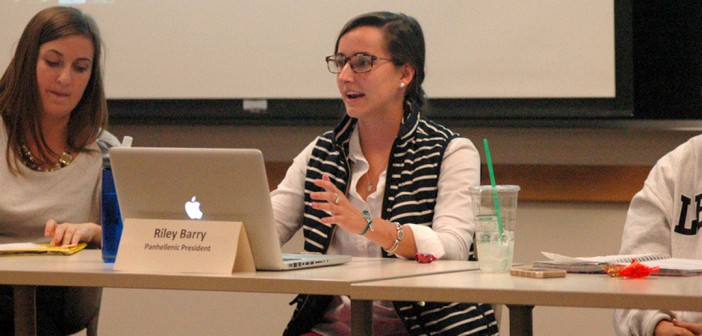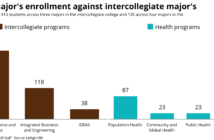Lehigh’s campus consists of 17 residential and non-residential fraternities, nine residential sororities, and five non-residential chapters for culturally-based organizations. Each of these Greek associations is organized under a corresponding council, with each of those councils reporting to the Office of Fraternity and Sorority Affairs.
The Greek councils are in place to urge chapter members to interact and build bonds with students involved in chapters besides their own.
Lehigh’s Interfraternity Council organizes events to build bonds between fraternities. The IFC also creates programs to make recruitment easier for potential new members. Brotherhood recruitment officers are assigned to residence halls to relay information about recruitment to those interested in joining a fraternity.
The Panhellenic Council focuses on expanding relationships between Lehigh’s sororities through community service events and intersorority events such as Pink Week, Greek Week, Hazing Prevention Week and Women’s Empowerment Week. Similar to IFC, Panhel has a program where Rho Gammas, disaffiliated chapter members who aid potential new sorority members, are assigned to residence halls for meetings to inform potential new members of upcoming events.
The Multicultural Greek Council consists of two sororities and three fraternities and is different from the other Greek councils in that it is much smaller.
“With a total of 12 people within the five organizations, and with us being multicultural organizations, our issues are not always the same as those seen in IFC and Panhel,” said Gladys Castellon, ’17, president of Mu Sigma Upsilon Sorority, Inc., one of the two MGC sororities. “We are also all culturally-based organizations, which makes what we do as organizations a little different than others might… like the stepping and strolling that we do.”
In addition to the relationships built between sororities through Panhellenic Council, those built between fraternities through IFC and those built between culturally-based chapters through MGC, these councils push to expand relationships in the entire Greek community.
“Panhel is close with both the IFC and MGC more so now than ever,” said Riley Barry, ’15, the president of the Panhellenic Council. “We collaborate together on numerous events and programming initiatives.”
For example, all three councils feel that service is one of the greatest parts about being involved in Greek life. As stated on the IFC website, the Greek councils have agreed to take the Million Minute Challenge, which “challenge(s) the Greek community to work together to amass a combined 1,000,000 minutes of service over the course of the 2014-2015 school year”.
Castellon feels that the relationships between the Greek councils will only continue to grow.
“I think that our relationships with the other councils is definitely growing,” Castellon said. “A lot of (Greek members) really want to bridge the gap between the different councils, as we are all a part of this Lehigh Greek community, and ultimately a part of the greater Lehigh community.”
Panhel and IFC have an executive board that consists of student officers. MGC is also controlled by students, but has a smaller executive board of only three people.
Students can gain interest in being a part of these councils by getting involved in Lehigh’s Greek Emerging Leaders program.
Greek Emerging Leaders is a leadership program that mentors new members and helps them develop skills in order to be a leader within the Greek community.
Kate Woodward, ’17, is a Greek Emerging Leader and said that the program’s main goal is to, “develop a more integrated Greek community and to come together to talk about issues within the community.”
Not only do these councils focus on relationships between students involved in Greek life, but the councils maintain close relationships with the Office of Fraternity and Sorority Affairs as well as the Greek Alumni Council.
“Panhel is very close with the OFSA,” Barry said. “We have developed a very strong relationship with all of the staff members, especially our adviser Ashley.”
The OFSA fulfills various roles by providing programs and services for Lehigh’s Greek community. They expect the best from Greek life, and through the accreditation process, which is an annual assessment of each Greek chapter, the OFSA can address any issues a chapter may have and recognize the positive things that a chapter is doing.
The Greek Alumni Council works closely with the OFSA through liaison officers to maintain contact with leaders of chapter alumni organizations and the Greek leadership coordinators in the OFSA.
These councils are crucial to the success of Greek life at Lehigh, and each caters to the needs of different chapters. They provide a connection between administration and students, as well as build relationships between students in different houses.






Comment policy
Comments posted to The Brown and White website are reviewed by a moderator before being approved. Incendiary speech or harassing language, including comments targeted at individuals, may be deemed unacceptable and not published. Spam and other soliciting will also be declined.
The Brown and White also reserves the right to not publish entirely anonymous comments.